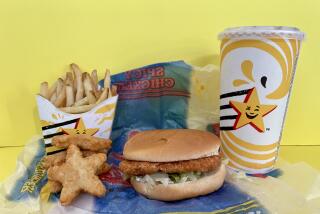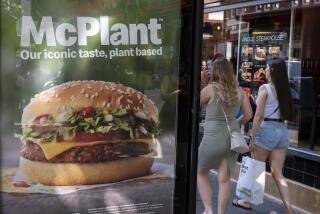EarthShell’s Fate Hinges on Biodegradable Boxes
- Share via
The simple brown cardboard box surrounding a Big Mac costs McDonald’s Corp. only pennies. A biodegradable version, by contrast, is costing EarthShell Corp. millions of dollars, not to mention the possible future of the company.
The Santa Barbara-based company faces a key test in the next few months in its effort to sell biodegradable food containers to the fast-food industry.
According to EarthShell, McDonald’s has approved its latest design for a hinged-lid Big Mac container. The question is whether EarthShell and its manufacturing partner, Sweetheart Cup Co., can produce the clamshell-shaped box in the huge volumes required by the 29,000-restaurant international hamburger chain at a price competitive with current packaging.
EarthShell so far has invested $194 million trying to build the new burger box. Though it has some small contracts to provide biodegradable packaging products for the federal government and others, EarthShell’s fate is largely tied to whether McDonald’s decides to purchase the Big Mac container.
A deal would give EarthShell the seal of approval from the world’s foremost fast-food company, an instant marketing coup in the $9-billion domestic food service disposable packaging market.
McDonald’s sells an estimated 600 million Big Macs annually. EarthShell would supply containers for part of that volume, and it is betting that other fast-food restaurant chains would be interested too.
But the company continues to run into obstacles.
Earlier this month, EarthShell disclosed in a regulatory filing with the Securities and Exchange Commission that the “debugging and start-up of the manufacturing facility have taken much longer and cost more money than originally anticipated.”
EarthShell has less than $8 million left in the bank from the more than $200 million it raised in a 1998 stock sale. And with a burn rate comparable to many failed dot-com companies, new delays or setbacks could force EarthShell to seek more capital funding to continue development and marketing of its biodegradable containers, bowls and plates. It spent $37 million on development last year and $31 million in 1999.
The company acknowledges as much in the SEC filing, saying that if McDonald’s were to “withdraw as the initial purchaser . . . the introduction and market acceptance” of other EarthShell products could be delayed, damaging the company’s financial position.
The EarthShell containers, which have the look and feel of their traditional Styrofoam counterparts, are made from limestone, potato starch, recycled milk-carton fibers and natural waxes. EarthShell says the containers can be tossed in with typical compost-pile waste and will biodegrade in less than a year.
But competitors, including those that make plastic-foam sandwich containers, say that whether a fast-food container is biodegradable makes little difference to the environment these days. Fast-food containers, they say, make up only a tiny percentage of landfill trash.
Moreover, they say, since modern landfills are built to be airtight because of pollution and water-quality regulations, nothing in them degrades, not even newspapers.
Although EarthShell has said McDonald’s will expand a test of the hinged-lid box in its Chicago-area restaurants, there has been no confirmation from the fast-food giant. McDonald’s has refused to talk about the project, saying only that EarthShell is one of its many suppliers. A spokeswoman said the Oak Park, Ill.-based company does not discuss anything that might be in the “development phase.”
After the SEC filing, EarthShell officials insisted they have access to enough cash to finish development of the containers and move into production.
Vincent Truant, EarthShell’s senior vice president, said the company has “significantly reduced” its rate of spending since completing a plant to produce the clamshell-style containers.
Truant also said EarthShell has tapped only about $16 million of $60 million available under an agreement to sell shares to Acqua Wellington North American Equities Fund. The fund specializes in equity-financing arrangements with small, often cash-strapped technology and health-sciences companies.
The terms of the financing deal state that EarthShell “generally may not draw down” its cash line unless its stock is trading at a minimum of $3 a share. But because of EarthShell’s low share price, that requirement has been ignored. The latest sales were at $1.13 a share, according to financial documents. EarthShell has collected an average price of $1.87 for the nearly 9 million shares it has sold to Acqua.
EarthShell shares, which rose 15 cents Thursday to finish the week at $2.32 on Nasdaq, trade at only a fraction of their $21 initial share price in the March 1998 stock offering, which raised $206 million.
Since its founding in 1992, EarthShell’s quest to develop biodegradable fast-food packaging and plates has yet to lead to revenue for the company, even from the 7 million Big Mac containers sold to Chicago-area stores in recent months.
A licensing agreement lets Sweetheart Cup--the manufacturer--use any revenue from the test program to offset equipment investments.
Though 7 million Big Mac containers may seem like a big number, it amounts to just $300,000 to $400,000 in sales, based on the price of existing disposable fast-food burger containers. And it represents just a tiny fraction of what McDonald’s, which serves 45 million customers daily in 120 countries, uses.
Fast-food chains have searched for high-quality, biodegradable packaging for more than a decade.
Foam boxes can take hundreds of years to degrade and threaten the health of birds and other wildlife as they break into small pieces, said Arthur Weissman, president of Green Seal, a Washington-based nonprofit organization that companies, including EarthShell, pay to certify that their products are environmentally friendly.
A deal with McDonald’s would be significant, Weissman said, because “McDonald’s has a tremendous impact on the environment through its thousands of outlets and the millions of hamburgers it sells.”
Fast-food packaging varies by chain. McDonald’s uses cardboard for its Big Mac; Jack in the Box Inc. uses a foil wrap for its Ultimate Cheeseburger. Other chains use either foam boxes or plastic-coated wrapping paper. The choice of packaging is based on a variety of factors, ranging from price to appearance to the ability of a material to keep food warm.
In an industry notorious for its price competition, even a penny difference in container prices can affect a chain’s profit, said Jeff Cole, product manager for Genpak Corp., one of the nation’s largest manufacturers of foam sandwich containers.
Cole said he believes that the EarthShell container will be more expensive than existing products, which could hurt its acceptance in such a price-sensitive industry.
“The restaurant either has to absorb the extra cost or add it to the price of the hamburgers,” Cole said.
But Truant said that won’t be a factor. “We are not at a premium price to the product we are replacing,” he said.
(BEGIN TEXT OF INFOBOX / INFOGRAPHIC)
A Better Burger Box?
Santa Barbara-based EarthShell Corp. is betting on a new kind of insulating burger container that is made of more eco-friendly ingredients. How its container compares:
*
Polystyrene
Cost: 2-5 cents
Material: Petroleum Time to degrade: 500-700 years
*
EarthShell
Cost: 2-5 cents
Material: Limestone, potato starch, recycled fibers, waxes
Time to degrade: Less than a year
*
Sources: EarthShell, Green Seal, industry estimates
More to Read
Inside the business of entertainment
The Wide Shot brings you news, analysis and insights on everything from streaming wars to production — and what it all means for the future.
You may occasionally receive promotional content from the Los Angeles Times.











